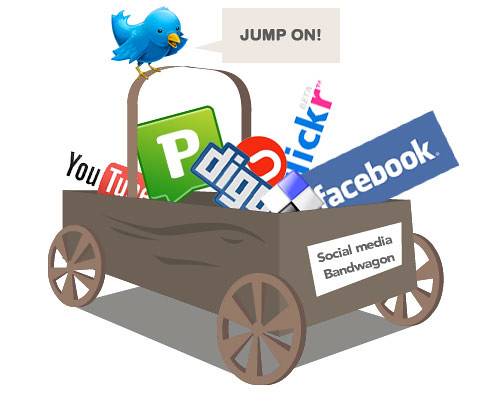But Facebook and Twitter are both arenas where there are plenty of opportunities Unfortunately, a lot of those are opportunities to make a complete prat of yourself. So before you get all excited about “going viral” or whatever it is the kids are doing these days, maybe you should have a look through these common mistakes.
The Internet Is Not Your Megaphone
When you sit back and watch Mad Men these days, aside from the constant cigarette smoke and misogyny, it must look like something of an idyllic time for working in advertising. There were radios, and TVs and newspapers, and you put your adverts in the radios and TVs and newspapers, and the consumers lived up to their name. If they liked your adverts, they would buy your products. If they didn’t, they wouldn’t.
It was a simpler time.
The most common mistake most business social media marketing makes is to not realise that things have changed. Twitter isn’t just a newfangled newspaper where everything has to fit into 140 characters. The exasperated cry of many a new entrant into the twittersphere is “We keep following people, but nobody is following us back!”
You’ve got some tough barriers to get over here, because after your average person has spent any time on twitter they develop a keen eye for what they see as the twitter equivalent of spam. I just checked my own followers list and among my recent followers are several young women “looking for a good time” with a suspicious link in their profile, and five different martial arts schools because the other day I made a joke about the Karate Kid. I won’t be following any of them back.
You need to reverse engineer this, think about what information you’re putting in your twitter feed, and who would want to hear that. Is there a broader subject that relates to the products you sell? For instance, if you’re selling sporting goods, why not jump into some of the conversations about sports going around?
Another option is create a character that people want to interact with. One of the biggest mistakes in social media marketing I’ve seen this year is the way Shippam’s Fish Paste handled the fake account that had been set up in their name. A comedy writer set up the twitter feed as a parody, playing a social media marketing intern who didn’t really know what he was doing. He ham-fistedly threw around terms like “engaging with our brand” and asked people about their favourite fish paste experiences in a way that was incompetent, but sort of charmingly naive. Shippam’s Fish Paste got thousands of followers, and there are probably more people who know about Shippam’s Fish Paste from that twitter account then were familiar with the seafood based sandwich filling beforehand. Shippam’s shut the account down. What they should have done was offer the guy a job.
You Need To Actively Build Your Followers
There are plenty of people who can give you great advice on building your social media profile: People who have successfully used it to build their own business, marketing specialists who have spent time helping other companies build their profile, bloggers who have made their entire career around connecting with people online. You know you shouldn’t go to for advice? A fictional character played by Kevin Costner who built a baseball field, for ghosts. He really doesn’t have the business acumen, and he doesn’t exist.
What I’m saying is: If you build it, they won’t necessarily come.
Once you’ve got your Twitter and Facebook profiles set up, you can’t just sit back and wait for the fans and followers to crowd in. All those people you’re looking to attract- they’re busy. They’ve got friends to talk to, games of Words With Friends to win, pictures of otters that look like Benedict Cumberbatch to giggle at. If you want them to spend their valuable procrastination time on your company’s page, you’re going to have to give them a reason.
Reach out to people. Put up competitions and special offers. Make sure there is always something happening so that people have a reason to come back, then get out there and tell people about it.
Treating Your Friends/Fans/Followers Like A High Score
Perhaps this is a problem unique to my generation. Those of us born in the eighties were trained from a very early age that if you see a number in the top right hand corner of screen, your goal is to make that number as high as possible. If Twitter included a “Puppies kicked” counter the results would be too horrifying to imagine.
But, if you’ll allow me to come across as the villain from a Muppet movie for a second, in business you don’t measure you success by how many friends you have. Your high score isn’t on your Facebook page, it’s on your bank balance.
Instead of obsessively measuring how many friends or followers you are gathering, see what you can do to turn the ones you have into customers. Keep providing them with relevant, engaging content that will keep them coming back.
Being Unprepared For The Bad Stuff
Say you’ve done all this and your online profile is enjoying success. You’re still not ready for the biggest hazard of social media marketing. Remember when I said you had to interact with your customers? Well, often those customers will have things to say that maybe you don’t want to hear. For a good example of the worst you could get try going to one of the Domino’s Pizza facebook pages. They’ve got several, one for every region they operate in, pick one, it doesn’t matter. I just went there now and one of the first comments I could see was “your pizza tastes like the inside of a wooden leg”. It was also one of the more family friendly I could see.
This isn’t something you should take personally. The Internet exists to pour derision and scorn upon all it surveys, and if you’ve begun attracting it that probably just means you’re reaching a lot of people. Or that your pizza tastes terrible. Managing this feedback is one of the tougher marketing jobs you’ll have to do.
Here you need to use a judgement call. What you don’t, and I repeat don’t do, is answer back in anger. If you start a slanging match with the Internet you will lose. Your options are either, moderation, if it’s on a forum you control such as Facebook, delete any comments that are just outright abusive. If comments have specific complaints, then deal with them as you would any other complaint, doing everything you can to please the customer. This can actually help your case, as others will see you dealing well with the complaint. Sometimes however, the only option you have to hand is try ignore the most outright abusive comments. Grin and bear it, it’ll pass.
Above all, remember this is not the be all and end all of your business. There are plenty of opportunities here, but keep your marketing going in other arenas as well.
Barry Magennis is an SEO executive working with Haymarket Business Media. In his spare time, he writes about numerous subjects, including jobs in media.






Comments
0 comments